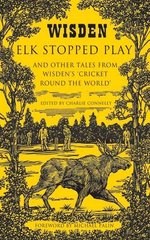Elk Stopped Play
Archie Mac |Published: 2014
Pages: 140
Author: Connolly, Charlie (Editor)
Publisher: Bloomsbury
Rating: 4 stars

That fine cricket writer Peter Roebuck, opined that, due to television coverage, it was inevitable that one day, football (soccer) would be the dominant sport in every country except India, where he believed cricket would remain supreme. Perhaps this new book would sate Roebuck, as it shows just what a redoubtable lot cricketers are.
Elk Stopped Play features articles from Wisden’s Cricket Round the World section which was introduced in 1993 by Matthew Engel. Since its launch the section quickly became a favourite, and is now a staple of the old yellow tome.
This selection from Cricket Round the World is edited by Charlie Connelly, although the title editor does Connelly a disservice as he writes approximately half the book himself. The format has stories about a number of countries listed in alphabetical order, with a number of follow ups provided by Connelly. These follow up entries are written in an amusing manner and are a highlight of the book.
Connelly appears to have tracked down a number of the authors of the original articles which appeared in Wisden. No easy task as none of the writers are well known, and some of the countries featured would test even a geographer. It is a pity, although understandable, that Connelly could not find them all, so some countries have only the original entry.
What a variety of countries are featured; the book starts with Angola and finishes with Western Samoa and covers many countries you may never have heard of, let alone suspected played the game of cricket. Some of the entries are amusing, and some inspiring such as the entry for Rwanda, whose players picked up the game while refugees from war, and where fielders often find human bones on the boundary, as the ground is located near the site of a massacre where 3000 Tutsis were slaughtered.
One entry summed up what cricket and life should be about, and is provided by one of the poorest of countries, Bhutan, which measures its success not on wealth but on a scale of gross national happiness. Although the anecdote from the Cook Islands was possibly the most amusing; two teams of locals had been involved in a game of cricket for six hours to see which village would gather the coconuts for both villages on the morn. An American visitor pointed out that both villages would achieve more if both worked a few hours instead of putting so much effort into cricket just to decide who worked for a few minutes. A local named Tapipi pondered this observation before he finally replied “it would be hard work gathering coconuts tomorrow, for the people would be stiff and tired from the cricket game”. Ah priorities.
There is plenty to learn as well, for instance the ‘Don’ has an Italian great-grandfather who migrated to Australia and had 25 children, one, an illegitimate daughter was the grandmother of Bradman.
The Italians may claim a great cricket connection, and it hopefully equates to more of an understanding of the game than their Spanish cousins. With one Spaniard, when told his concern for a muddy, sweaty neighbour was misplaced as he was dishevelled because he had played cricket, asked “and your horse?”
For the curious, the Elk that stopped play was in Finland, and that story fits in nicely with the rest of the book, where bombs, bats shattering because of the freezing temperatures, and riot police can also be responsible for the cessation of a match. A quality read that should not be missed.






Leave a comment